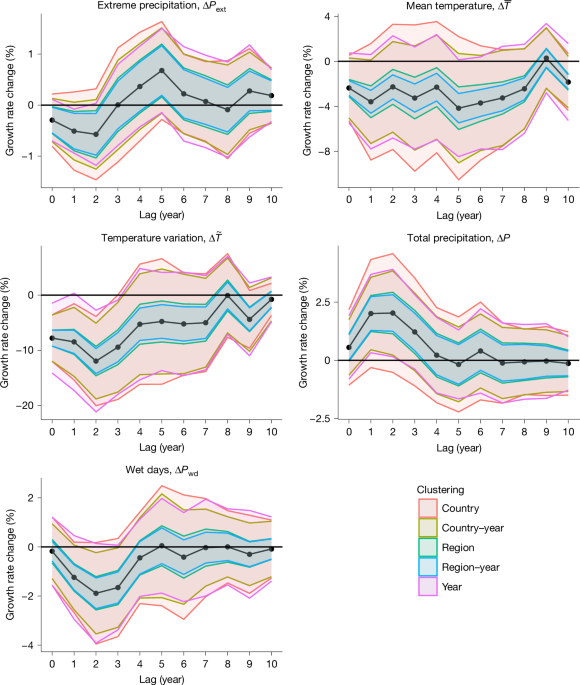O’Neill, B. et al. in Climate Change 2022: Impacts, Adaptation and Vulnerability (eds Pörtner, H.-O. et al.) 2411–2538 (Cambridge Univ. Press, 2022).
Kotz, M., Levermann, A. & Wenz, L. The economic commitment of climate change. Nature 628, 551–557 (2024).
Dell, M., Jones, B. F. & Olken, B. A. Temperature shocks and economic growth: evidence from the last half century. Am. Econ. J. Macroecon. 4, 66–95 (2012).
Burke, M., Hsiang, S. M. & Miguel, E. Global non-linear effect of temperature on eco-nomic production. Nature 527, 235–239 (2015).
Pretis, F. et al. Uncertain impacts on economic growth when stabilizing global temperatures at 1.5 °C or 2 °C warming. Phil. Trans. R. Soc. A 376, 20160460 (2018).
Kahn, M. E. et al. Long-term macroeconomic effects of climate change: a cross-country analysis. Energy Econ. 104, 105624 (2021).
Krichene, H. et al. The social costs of tropical cyclones. Nat. Commun. 14, 7294 (2023).
Wenz, L. et al. DOSE—global data set of reported sub-national economic output. Sci. Data 10, 425 (2023).
Schlenker, W. & Roberts, M. J. Nonlinear temperature effects indicate severe damages to U.S. crop yields under climate change. Proc. Natl Acad. Sci. USA 106, 15594–15598 (2009).
Hsiang, S. M. Temperatures and cyclones strongly associated with economic production in the Caribbean and Central America. Proc. Natl Acad. Sci. USA 107, 15367–15372 (2010).
Auffhammer, M. et al. Using weather data and climate model output in economic analyses of climate change. Rev. Environ. Econ. Policy 7, 181–198 (2013).
Liang, K. Y. & Zeger, S. L. Longitudinal data analysis using generalized linear models. Biometrika 73, 13–22 (1986).
Akaike, H. Information theory and an extension of the maximum likelihood principle. In Proc. 2nd International Symposium on Information Theory (eds Petrov, B. N. & Csaki, F.) 267–281 (Akademiai Kiado, 1973).
Schwarz, G. Estimating the dimension of a model. Ann. Stat. 6, 461–464 (1978).
Field, C. A. & Welsh, A. H. Bootstrapping clustered data. J. R. Stat. Soc. Ser. B 69, 369–390 (2007).
Kotz, M., Wenz, L. & Levermann, A. Data and code for “The economic commitment of climate change”. Zenodo https://doi.org/10.5281/zenodo.10562951 (2024).


